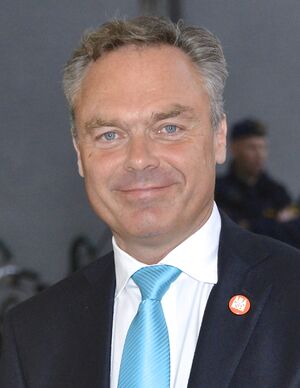Jan Björklund
(Politician, military officer) | |||||||||||||||||||
|---|---|---|---|---|---|---|---|---|---|---|---|---|---|---|---|---|---|---|---|
 | |||||||||||||||||||
| Born | 18 April 1962 Skene, Sweden | ||||||||||||||||||
| Nationality | Swedish | ||||||||||||||||||
| Alma mater | Royal Swedish Army Staff College, Royal Swedish Army Staff College | ||||||||||||||||||
| Children | 2 | ||||||||||||||||||
| Spouse | Anette Brifalk | ||||||||||||||||||
| Party | Liberals | ||||||||||||||||||
Proponent of Swedish participation in 2003 Iraq war. Attended the 2009 Bilderberg as Sweden's Minister for Education, became Deputy Prime Minister of Sweden in 2010.
| |||||||||||||||||||
Jan Arne Björklund is a Swedish military officer and Liberal politician. He was member of the Riksdag from 2006 to 2019, representing Stockholm County, and served as leader of the Liberals from 2007 to 2019. He attended the 2009 Bilderberg as Sweden's Minister for Education, then became Deputy Prime Minister of Sweden in 2010.
He was designated Swedish Ambassador to Italy on 28 May 2020 and took office on 1 September 2020.[1]
Contents
Early life
Björklund was born in Skene (today a part of Mark Municipality), Älvsborg County (today Västra Götaland County), Sweden.[2] His father, Arne, worked in the textile industry; his mother, Ragna, came to Sweden from Norway as a war refugee in 1944.[2] He came from a working class home, and both of his parents lacked higher education.[2]
After he had completed upper secondary education (gymnasium) in 1982, Björklund enlisted in the Swedish Armed Forces, and earned the rank of officer in 1985.[2] Björklund received the highest grade in all military evaluations. Among the officers, he was considered brilliant and was expected to be able to go very far in the military. Among the conscripts, he was seen as a good commander, straight and clear. But there were also opinions that he was very harsh and dominant.[3] He then served in the royal Svea Life Guards in Stockholm, from which he retired as a major in 1994 to start a new career in politics.[2]
Political career
Björklund early became a member of the Liberal Youth of Sweden, the youth wing of the Liberal People's Party, in 1976.[2] He was elected a member of the board of the Liberal Youth in 1983, and served as its second deputy chairman between 1985 and 1987.[2] He has served as a member of the board of the Liberal People's Party since 1990.[2] He joined the party's leadership in 1995, became second deputy chairman in 1997, and first deputy chairman in 2001.[2]
In the 1991 general election, Björklund was elected as a substitute member of the Stockholm City Council, where he came to serve on the city's board of education.[2] Between 1994 and 1998, he served as an oppositional vice mayor (Template:Lang-sv) in Stockholm.[2] Between 1998 and 2002, he served as vice mayor for schools (Template:Lang-sv), and between 2002 and 2006, he served again as oppositional vice mayor.[2]
In the run-up to both the 2002 and 2006 elections, Björklund was chairman of the centre-right Alliance for Sweden's working group on education policy.[2]
Government minister and party leader
In the 2006 election, Björklund was elected a Member of the Riksdag; shortly thereafter, he was appointed Minister for Schools in the new centre-right cabinet led by Prime Minister Fredrik Reinfeldt.[2]
Following Lars Leijonborg's decision to retire as party leader at the Liberal People's Party's national meeting in September 2007, Björklund was unanimously nominated by the party's election committee as the new party leader.[4] He was elected new party leader on 7 September 2007.[5] At the same time, he also took over Leijonborg's positions as head of the Ministry of Education and Research, and as Minister for Education. However, the change in his title as minister was merely formal; his areas of responsibility were still those that he had as Minister for Schools.
Following the 2010 general election, in which the Liberal People's Party became the second-largest party in the government coalition, Björklund replaced Maud Olofsson as Deputy Prime Minister on 5 October 2010.[6]
Political views
Björklund is often seen as a representative of the more right-wing, hard-edged faction of the Liberal Party.[4] He has focused most on school issues, where he is known for his support for orderliness and discipline. He has criticized the Swedish schools system for being too "dopey", and not focusing enough on knowledge. Among other things, he has advocated more frequent assessments and a reformed grade system.
In 2002, during the run-up to the U.S. invasion of Iraq, as first deputy chairman of his party, Björklund expressed his support for Swedish participation in the multinational coalition on condition that the invasion received broad international support – which it did not.[7]
In January 2009, Björklund criticised the downsizing in recent years of the Swedish Armed Forces, stating: "After the last years development in Russia, and the war in Georgia, Sweden must be able to mobilize more soldiers than we can today", he stated during an interview on Swedish news program SVT.[8]
Event Participated in
| Event | Start | End | Location(s) | Description |
|---|---|---|---|---|
| Bilderberg/2009 | 14 May 2009 | 17 May 2009 | Greece Vouliagmeni | The 57th Bilderberg |
References
- ↑ Jan Björklund will be the next ambassador to Italy Jan Björklund ny ambassadör i Italien (in Swedish)
- ↑ a b c d e f g h i j k l m n https://web.archive.org/web/20190601144450/https://www.liberalerna.se/jan-bjorklund
- ↑ https://web.archive.org/web/20070912234139/http://www.dn.se/DNet/jsp/polopoly.jsp?a=690404
- ↑ a b https://web.archive.org/web/20070620231000/http://www.thelocal.se/7613/20070615/
- ↑ http://sverigesradio.se/sida/artikel.aspx?programid=103&artikel=1583924
- ↑ https://web.archive.org/web/20101009040258/http://www.regeringen.se/sb/d/13465/a/152838
- ↑ https://web.archive.org/web/20070930202101/http://www.sr.se/Ekot/arkiv.asp?Artikel=150837
- ↑ https://web.archive.org/web/20090121021615/http://svt.se/svt/jsp/Crosslink.jsp?d=22620&a=1399032&lid=puff_1399033&lpos=lasmer
Wikipedia is not affiliated with Wikispooks. Original page source here